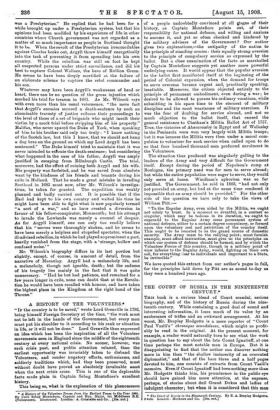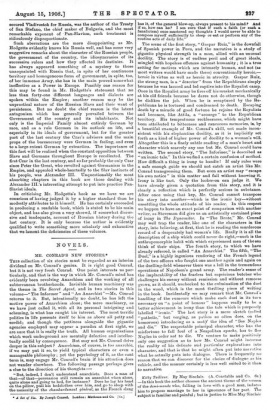THE COURT OF RUSSIA IN THE NINETEENTH CENTURY.*
THIS book is a curious blend of Court scandal, serious biography, and of the history of Russia during the nine- teenth century. While containing a good deal of sound and interesting information, it loses much of its value by an exuberance of trifles and an awkward arrangement. At his worst, Mr. Brayley Hodgetts is a mere reporter of "Count Paul Vasili's" chronique scandaleuse, which might as profit- ably be read in the original. At the present moment, for example, a reader would naturally turn to see what the work in question has to say about the late Count Ignatieff, at one time perhaps the most notable man in Europe. But it is disappointing to find that the author can discover nothing more in him than "the shallow insincerity of an overrated diplomatist," and that of the bare three and a half pages devoted to him, one consists of extracts from Count Vasili's memoirs. Even if Count Ignatieff had been nothing more than Mr. Hodgetts thinks him, his prominence in the public eye should have gained him more attention, at the expense, perhaps, of stories about dull Grand Dukes and ladies of indulgent character; but when it is considered that this man • The Court of Russia in the Nineteenth Century. By E. A. Brayley Hodgetts. 2 vols. London Methuen and Co. [242. net.]
secured Vladivostok for Russia, was the author of the Treaty of San Stefano, the chief maker of Bulgaria, and the most remarkable exponent of -Pan-Slavism, such treatment is ridiculously disproportionate.
Such aberrations are the more disappointing as Mr. Hodgetts evidently knows his Russia well, and has some very suggestive remarks about the character of the Russian people, the government of the country, the idiosyncrasies of its successive rulers and how they affected its destinies. It has always appeared something of a mystery to those unacquainted with Russia that, in spite of her continuous territory and homogeneous form of government, in spite, too, of her immense Army, she has in the main proved somewhat ineffective as a Power in Europe. Possibly one reason for this may be found in Mr. Hodgetts's statement that no less than forty-one different languages and dialects are spoken within the Empire; another reason may be the unpractical nature of the Russian Slays and their want of persistence. But no doubt the chief reason is the latent antagonism which has generally prevailed between the Government of the country and its inhabitants. Not only is the Imperial Family almost entirely German by race, and as a rule German in its outlook on life, and especially in its ideals of government, but for the greater part of the last century the Czar's advisers and the main props of the bureaucracy were German in feeling, and even to a large extent German by extraction. The importance of this fact will be realised when the constant opposition between Slays and Germans throughout Europe is recollected. The first Czar in the last century, and so far probably the only Czar since Peter the Great, who revolted against Germanism in the Empire, and appealed whole-heartedly to the Slav instincts of his people, was Alexander III. Unquestionably the most absorbing chapters in this book are those dealing with Alexander III.'s interesting attempt to put into practice Pan- Slavist ideals.
In criticising Mr. Hodgetts's book as we have we are conscious of having judged it by a higher standard than he modestly attributes to it himself. He has certainly succeeded in producing a readable book, which is stated to be his main object, and has also given a very shrewd, if somewhat discur- sive and inadequate, account of Russian history during. the last century. It is only because the author is evidently qualified to write something more scholarly and exhaustive that we lament the deficiencies of these volumes.







































 Previous page
Previous page